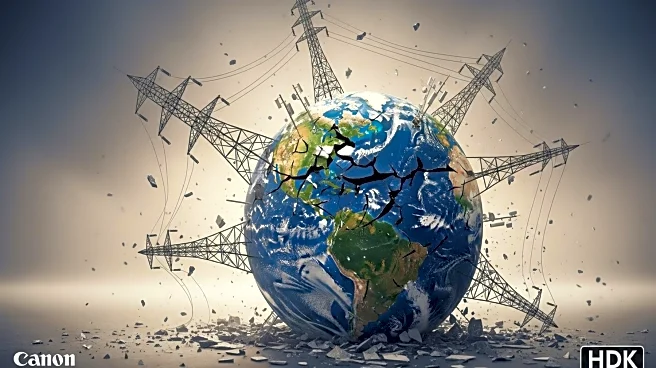What is the story about?
What's Happening?
A 6.9-magnitude earthquake struck the central Philippines, specifically Cebu province, causing significant damage and loss of life. The earthquake occurred at 9:59 p.m. local time, with the epicenter near the city of Bogo. The Office of Civil Defense reported at least 69 fatalities and 147 injuries. The quake has left towns without power and communication, and numerous businesses have been damaged. The hardest-hit area was Bogo, where roads and bridges are being assessed for damage. The earthquake triggered landslides and caused several bridges and roads to become impassable. Eight cities and municipalities are without power, and three are without communication. The earthquake also interrupted the Miss Asia Pacific International pageant in Cebu city, causing damage to the hotel ballroom.
Why It's Important?
The earthquake's impact on infrastructure and communication systems in Cebu province highlights the vulnerability of the region to natural disasters. The Philippines is located on the Pacific Ring of Fire, making it prone to earthquakes and volcanic activity. The disruption of power and communication can hinder rescue and relief efforts, potentially increasing the casualty count. The event underscores the need for improved disaster preparedness and infrastructure resilience in the Philippines. The economic impact on local businesses and the suspension of classes and work in affected areas further complicates recovery efforts.
What's Next?
Cebu governor Pamela Baricuatro is coordinating emergency responses and has set up a temporary command center to provide food, medicine, and equipment to affected towns. President Ferdinand Marcos Jr. is expected to visit the Cebu hospital to assess the situation. San Remigio and Tabuelan have declared a state of calamity to expedite relief efforts. The situation is exacerbated by recent rainfall, which could lead to further landslides. The Philippines may need to seek international assistance to manage the crisis effectively.
Beyond the Headlines
The earthquake's occurrence on a previously unmapped fault highlights the need for more comprehensive geological surveys and monitoring systems in the Philippines. The event may prompt a reevaluation of building codes and disaster-resilient infrastructure, especially in areas prone to seismic activity. The psychological impact on residents, who have recently faced a tropical storm, is significant, emphasizing the importance of mental health support in disaster recovery.















